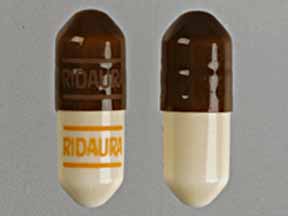Ridaura Disease Interactions
There are 9 disease interactions with Ridaura (auranofin).
- Bone marrow aplasia
- Gold induced disorders
- Congestive heart failure
- Diabetes mellitus
- Liver disease
- Rash
- Renal dysfunction
- Severe hypertension
- Systemic lupus erythematosus
Auranofin (applies to Ridaura) bone marrow aplasia
Major Potential Hazard, High plausibility. Applicable conditions: Bone Marrow Depression/Low Blood Counts
The use of auranofin and other gold compounds is contraindicated in patients with a history of gold- induced bone marrow aplasia. Prior to gold compounds therapy, a complete blood count with a differential, platelet count, urinalysis, and renal and liver function tests should be performed. A complete blood count with a differential, platelet count, and urinalysis should be done at least monthly during therapy. Hematological warning signs of gold toxicity include a drop in hemoglobin, leukopenia (WBC < 4,000/mm3), granulocytopenia (< 1,500/mm3), and thrombocytopenia (<100,000/mm3).
Auranofin (applies to Ridaura) gold induced disorders
Major Potential Hazard, Moderate plausibility. Applicable conditions: Inflammatory Bowel Disease, Dermatitis - Drug-Induced, Infectious Diarrhea/Enterocolitis/Gastroenteritis, Idiopathic Pulmonary Fibrosis
The use of auranofin is contraindicated in patients with a history of any of the following gold- induced disorders: anaphylactic reactions, necrotizing enterocolitis, pulmonary fibrosis, and exfoliative dermatitis.
Gold compounds (applies to Ridaura) congestive heart failure
Major Potential Hazard, Moderate plausibility.
The use of gold compounds is contraindicated in patients with uncontrolled congestive heart failure. Prior to initiation of gold compounds medical problems that might affect the signs and symptoms used to detect gold compounds toxicity should be under control.
Gold compounds (applies to Ridaura) diabetes mellitus
Major Potential Hazard, Low plausibility.
The use of gold compounds is contraindicated in patients with controlled diabetes mellitus.
Gold compounds (applies to Ridaura) liver disease
Major Potential Hazard, High plausibility.
The use of gold compounds is contraindicated in patients with hepatic dysfunction. Prior to gold compounds therapy, a complete blood count with a differential, platelet count, urinalysis, and renal and liver function tests should be performed. A complete blood count with a differential, platelet count, and urinalysis should be done at least monthly during therapy.
Gold compounds (applies to Ridaura) rash
Major Potential Hazard, High plausibility. Applicable conditions: Eczema
The use of gold compounds is contraindicated in patients with urticaria or eczema. Prior to initiation of gold therapy, medical problems that might affect the signs and symptoms used to detect gold toxicity should be under control.
Gold compounds (applies to Ridaura) renal dysfunction
Major Potential Hazard, High plausibility.
The use of gold compounds is contraindicated in patients with chronic renal failure. These patients may be at increased risk for renal toxicity. Prior to gold compounds therapy, a complete blood count with a differential, platelet count, urinalysis, and renal and liver function tests should be performed. A complete blood count with a differential, platelet count, and urinalysis should be done at least monthly during therapy.
Gold compounds (applies to Ridaura) severe hypertension
Major Potential Hazard, Moderate plausibility.
The use of gold compounds is contraindicated in patients with severe hypertension. Prior to initiation of gold compounds medical problems that might affect the signs and symptoms used to detect gold compounds toxicity should be under control.
Gold compounds (applies to Ridaura) systemic lupus erythematosus
Major Potential Hazard, High plausibility.
The use of gold compounds is contraindicated in patients with systemic lupus erythematosus. Prior to gold compounds therapy, a complete blood count with a differential, platelet count, urinalysis, and renal and liver function tests should be performed. A complete blood count with a differential, platelet count, and urinalysis should be done at least monthly during therapy.
Switch to professional interaction data
Ridaura drug interactions
There are 149 drug interactions with Ridaura (auranofin).
Ridaura alcohol/food interactions
There is 1 alcohol/food interaction with Ridaura (auranofin).
More about Ridaura (auranofin)
- Ridaura consumer information
- Check interactions
- Compare alternatives
- Pricing & coupons
- Reviews (2)
- Drug images
- Side effects
- Dosage information
- During pregnancy
- Drug class: antirheumatics
- Breastfeeding
- En español
Related treatment guides
Drug Interaction Classification
| Highly clinically significant. Avoid combinations; the risk of the interaction outweighs the benefit. | |
| Moderately clinically significant. Usually avoid combinations; use it only under special circumstances. | |
| Minimally clinically significant. Minimize risk; assess risk and consider an alternative drug, take steps to circumvent the interaction risk and/or institute a monitoring plan. | |
| No interaction information available. |
See also:
Further information
Always consult your healthcare provider to ensure the information displayed on this page applies to your personal circumstances.


